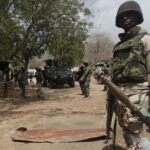It is unfortunate that the North is most often portrayed as backward and less developed. The founding fathers of the region were visionary leaders who had a developmental blueprint that would have leapfrogged the region into the class of developed regions by the turn of the millennium.
One of the past leaders of the North, the late Sardauna of Sokoto, Sir Ahmadu Bello, had an all inclusive educational policy that would have addressed the present problems of youth unemployment and restiveness. Under his policy the best 10 pupils in a class were sent to schools like Barewa College, Zaria and Government College, Kaduna, while the less intelligent would be sent to Government Secondary Schools (GSS) and Teacher Training Colleges (TTC). Those who constituted the bottom of the class were sent to tractor driving schools to learn vocations and would later be given a plot of land and equipment to start their own farms. His policy was all-inclusive and nobody was left out. Apart from his educational policies, Sardauna was also set to turn Northern Nigeria into an industrial hub by setting up textile factories in Kaduna. Today, the textiles factories that have the capacity of employing up to a million people are all dead. Sir Ahmadu Bello gave all northerners a sense of belonging there by producing a strong monolithic north. It is saddening to note that various groups in the north are engaged in conflicts taking up arms against each other. The policies of this great leader were not sustained over time leading to the present decay in the North.
At a recent forum held in Abuja the Governor of Borno State, Kashim Shettima said, “It is not only the Peoples Democratic Party (PDP) that is to be blamed. Virtually every political party that existed or exist within the last 16 years has played its own role in manipulating our diverse sentiments to gain political advantages. All political actors in these parties are to blame including my humble self. We have contributed in dividing the north and Nigeria but PDP takes the largest blame because it’s controlled the affairs of this country for 16 years.”
It is a source of concern that the present crop of elite in the north that had benefitted from the laudable policies of Sardauna could not run with his vision but instead turned out to be a bunch of greedy and selfish individuals that actively engaged in looting the treasuries in the northern states, leaving the region supine. Today, the north has a large army of angry illiterate, unemployed youth who constitute are ready recruiting ground for insurgents and miscreants.
In trying to fathom a way out of the present socio-economic quagmire of the North Shettima went ahead to suggest that, “first, we must make conscious efforts to sustain the renewed unity by addressing the needs of the masses through fairness and justice to all or the masses will unite against us the same way the united against incompetence in March 2015.”
The governor said the economy of the north compares extremely poorly to other regions of Nigeria. The region’s huge population remains largely uneducated and poorly skilled, while its vast arable land remains not properly utilized with its agricultural practices mainly characterized by drudgery and poor yield. Available statistics measuring such critical variables like literacy, healthcare, unemployment, access to basic social amenities, poverty, etc, clearly show that the North is considerable worse off economically compared to the rest of the country.
Shettima suggested that the Northern Governors Forum of which he is Chairman should pursue the implementation of a broad agenda: a Marshall Plan so to say, that will seek an aggressive social transformation of the North, strengthens its institutions and develops its basic infrastructure.
Great idea! But his Excellency failed to address one of the key problems that has contributed immensely to underdevelopment, poverty and disease in the North and Nigeria at large which is the issue of joint account between states and local governments. The joint account tends to deny the local councils of all funds earmarked for developmental projects at the grassroots. It is unfortunate that presently nothing is happening in local government areas across the nation where a larger percentage of Nigerians reside. The problem of joint account has rendered rural areas in Nigeria uninhabitable resulting in rural- urban migration that has choked the big cities over stretching available infrastructure.
Inalegwu wrote from Abuja
 Join Daily Trust WhatsApp Community For Quick Access To News and Happenings Around You.
Join Daily Trust WhatsApp Community For Quick Access To News and Happenings Around You.


